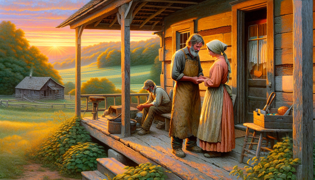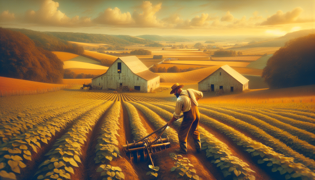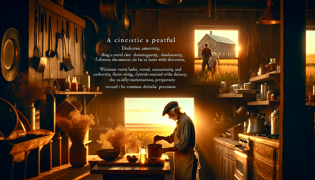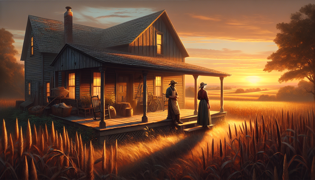Gone is Gone: Lessons of Empathy on the American Farm
Reading Time: 12 min

About Story: Gone is Gone is a from united-states set in the . This tale explores themes of and is suitable for . It offers insights. A farmer and his wife who trade places discover that each other's work is equally challenging.
Introduction
In the heartland of America, where the horizon stretches in boundless fields of amber and green, the Wilson farm stood as a testament to a way of life defined by sweat, hope, and an unspoken communion with nature. Every morning, as the first rays of sunlight painted the dew-kissed fields in hues of gold and amber, John Wilson would rise with the determination of an unyielding spirit, ready to tend to the sprawling lands that had been nurtured through generations. His wife, Martha, equally resolute and warm-hearted, orchestrated the symphony of the household from dawn until dusk, ensuring that the dusty farmhouse was filled with care, warmth, and the aroma of home-cooked meals.
Yet beneath the routines and the comfort of daily predictability simmered an unvoiced curiosity—a need to understand the nuances of the other’s toil. It was on an unassuming spring morning, with the gentle buzz of life returning after a long winter, that the couple decided to trade places. In a world where roles were as deeply entrenched as the ancient oak in the field, this act of daring empathy promised to reveal hidden challenges and newfound strengths. The decision was not born out of rebellion but rather a quiet recognition that the harmony of their life was built upon mutual sacrifice, a shared resilience often overlooked in the cadence of routine.
As the sun climbed higher, casting lively shadows and illuminating every corner of their humble abode, anticipation mingled with apprehension. The couple’s eyes, meeting over a steaming mug of coffee on the porch, carried the weight of unspoken promises: that in walking each other’s path, they would ultimately come to honor the invisible burdens and quiet glories that defined their existence. Thus began a journey not just across the farm, but into the very heart of understanding—a journey where each step on the worn earth was a step toward deeper love and respect.
A New Dawn of Swap
John Wilson stood at the edge of his property, the gentle caress of morning light brushing against his weathered face, when he made the decision that would shift his entire world. The idea of trading places with Martha had emerged slowly over many quiet evenings spent contemplating the silent sorrow behind her tired smiles. That morning, with determination stirring in his eyes, he resolved to step into her world. With a nervous smile and a sense of curiosity that defied his rugged exterior, John approached Martha along the creaking wooden porch. Amid the backdrop of chirping birds and the distant hum of a tractor beginning its day’s work, he proposed the exchange in a soft yet resolute tone.
Martha, whose hands had grown strong from years of both domestic diligence and quiet sacrifice, paused for a heartbeat. The idea was as radical as it was simple: for one month they would swap responsibilities, allowing each to experience firsthand the demands of the other’s labor. With a wistful chuckle, she agreed. That day, as the dew dissolved under the increasing warmth of the sun, the couple began their experiment in empathy. John donned an apron in place of his usual work shirt, and Martha traded her well-worn overalls for a simple cap and boots. The transformation was symbolic – a visible badge of the new challenge they were both eager yet apprehensive to face.
As they sat in the quiet sanctuary of the kitchen, now a theater of gentle reforms and exploratory heartbeats, the couple poured over plans for the day ahead. John listened intently as Martha explained the intricate timing of household chores: the careful precision of baking bread, the art of crafting meals from scratch, and the unappreciated labor of keeping their home a haven. Meanwhile, Martha reviewed with a blend of humor and seriousness the cyclical demands of fieldwork: the unpredictable temper of the weather, the physical endurance required to plow the fields, and the tiny miracles hidden in the act of nurturing the soil.
Their dialogue was punctuated with laughter and the occasional sigh, conveying layers of respect and the dawning realization that the roles they had inhabited for so long were steeped in a silent legacy of endurance. In the light of this new beginning, the farm itself seemed to pulse with a quiet approval. Each small gesture—a nod, a shared glance—echoed the hope that what they were undertaking could lead to a more profound appreciation of one another's worlds, forging a renewed partnership built on the wisdom that comes from truly walking in another’s shoes.

Trials in the Fields
John’s first foray into the demanding world of field work was a humbling experience that unfolded with relentless honesty under the glaring midday sun. The vast expanses of the farm, which he had once traversed with practiced ease, now felt like an alien terrain filled with the nuances of natural unpredictability. Clad in overalls and boots that felt both unfamiliar and heavy, he gripped the plow with cautious determination. The morning had started with innocent optimism, yet the day quickly revealed itself as a canvas of challenges. Beneath the relentless blue sky, John struggled against both the physical burden of the work and the intricate dance required to work in harmony with nature.
The fields, with their living tapestry of ripening crops and burgeoning weeds, demanded a steady rhythm that John had never before considered. Each row of budding produce carried with it an unspoken rule—a balance of patience, precision, and persistent effort. The vibrancy of the cultivated land contrasted sharply with the weariness that began to etch itself into his features, as the sun’s rays bore down with unyielding intensity. Each furrow he turned seemed to echo the labor of generations past, and with every stroke of the plow, he felt the buried struggles of countless hours of toil.
In this moment of transformation, John’s inner monologue was a mix of determination and envy for those who had mastered this form of art. The rhythmic sound of the soil breaking apart, the earthy scent that filled his nostrils, and the constant reminder of the farm’s living pulse were overwhelming. As he took short breaks beneath the sparse shade of a lonely oak tree, he began to truly appreciate the blend of physical strength and intuitive knowledge required in the daily maintenance of the land. He recalled countless moments when Martha, with a quiet grace, had spoken of the acres of hidden battles fought beneath the surface, where every seed was planted with hope and every harvest was a triumph over adversity.
The few hours in the fields metamorphosed into an unyielding test of endurance. With each new challenge—misaligned rows, unexpected rocky patches, and the variable moods of the weather—John’s respect for Martha’s world grew exponentially. Sweat dripped along his brow, not just as a sign of physical exertion, but as an emblem of newfound understanding. By the time the sun began its slow descent in the sky, painting long shadows across the land, John had not only labored with the field’s demands but had also sown the seeds of empathy in his heart. His struggle was now intertwined with the pulses of the earth, and every bead of sweat was a tribute to the silent art of nurturing life.

The Weight of the Hearth
As the sun dipped lower into the western sky, casting a gentle glow that softened the edges of the day, Martha embarked on her own odyssey of domestic labor—an arena that was as demanding in its own right as the raw forces of nature. In the comforting yet confining space of their farmhouse, Martha discovered that the rhythm of home life was no less taxing than that of the open fields. With John ensconced among the crops, she took up the mantle of managing the household. The shifting responsibilities demanded more than simple routine: they required a tacit mastery of timing, emotional nuance, and the seemingly endless cycle of preparation and care.
The kitchen, usually a domain where she reigned with effortless competence, transformed into a stage for subtle trials. Every sizzling pan and simmering pot echoed her once-hidden struggle—the relentless pressure to balance tradition with innovation, to serve nourishing meals while juggling the unpredictable demands of the household. Martha’s graceful hands, which had always carried the warmth of homemade bread and gentle reassurances to their children, now moved with an undercurrent of both precision and faltering uncertainty. It felt as though each cherished recipe was a relic of an ancient art, a craft to be mastered in the face of mounting domestic pressures.
Throughout the long afternoon, the sounds of chopping vegetables, the rhythmic beating of dough, and the distant calls of neighbors formed a continuous chorus of labor. Martha found herself immersed in a series of micro-challenges that tested not only her skill but her capacity for patience. The farmhouse itself, with its creaking floors and weathered walls, bore silent witness to her struggles. Every room she passed seemed to whisper tales of previous generations who had balanced the delicate interplay of family and farm. In quiet moments, as she wiped away a stray tear born of sheer exhaustion, Martha reflected on the invisible toll that every act of care exacted. The continuous demand to nurture the home, without the aid of the familiar comforts provided by years of routine, allowed her to glimpse the weight that John had long carried without words.
In those hushed hours, as dusk settled softly over the land and the domestic realm was bathed in a forgiving light, Martha’s heart grew heavy with both the burden of responsibility and the warmth of newfound insight. The home, with all its complexities and demands, revealed itself to be a living entity—capable of growth, and just as susceptible to the unyielding forces of life as the fertile fields outside.

Reconciliation Under the Golden Sky
That evening, as the sky transformed into a mosaic of golden and roseate hues, John and Martha reconvened on the weathered wooden steps of their farmhouse. The day’s labors had etched lessons into their souls—John, with the raw, physical intensity of the field, and Martha, with the subtle yet unyielding strain of the home. In the lingering light of a setting sun that bathed everything in a soft, forgiving glow, the couple shared their experiences with words that trembled between exhaustion and awe.
They spoke of the bitterness of perspiration and the sweetness of small victories found in the minutiae of daily tasks. John recounted his encounters with the unyielding terrain, confessing how each furrow of the field had mirrored the hidden complexities of care. Martha, in turn, revealed the silent battles waged in the heart of the home, where her strength was measured not in physical might but in the resilience of her spirit. Their exchanges, unadorned by pretense, bubbled with a gentle humor and frank vulnerability. The space between them, once filled with unspoken assumptions, now resonated with the clear, pure notes of empathy and understanding.
The golden light of the twilight, mingling with the soft shadows cast by ancient oak trees and weathered barn walls, underscored a visual hymn of unity and shared purpose. Against this luminous canvas, the couple’s faces revealed not fatigue, but a profound clarity—a recognition that their individual challenges were threads in the same intricate tapestry of life. The farm, echoing the cadence of nature and time, now bore witness to a transformation deeper than roles exchanged. It had become a living metaphor for balance and reciprocity, where every line drawn in the soil and every lovingly prepared meal affirmed the sacred symmetry between the physical and the domestic realms.
In the quiet communion that unfolded on that hallowed porch, John and Martha rediscovered the unbreakable bond that had always tied them together. The experience, as arduous as it was revelatory, taught them that true partnership was forged not in the ease of tradition but in the crucible of shared endeavor. With hearts lightened by understanding and minds enriched by the wisdom born of hardship, they accepted that every sacrifice was a seed for future growth—a lesson the farm would echo through the generations.

Conclusion
As the cool night reclaimed the farm, the stars emerging like scattered diamonds over the endless sky, John and Martha sat quietly in the soft glow of a single lantern. The exchange of roles had revealed far more than physical challenges; it had uncovered the timeless truth that in every heartbeat of labor there dwelt an inseparable mixture of pride, pain, and the quiet dignity of perseverance. In their newfound awareness, they found that the strength of their partnership was not built solely on expertise in one area or another, but on the shared sacrifices that stitched together the fabric of their daily lives.
In the gentle stillness that followed, the couple recounted the subtle insights gleaned from their day. John marveled at the methodical pace and emotional intricacies of home care, while Martha acknowledged the relentless and unpredictable nature of field work. Their conversation, spoken in soft murmurs beneath the canopy of an indigo sky, carried a raw honesty and unguarded respect that had remained hidden for too long. They understood, deeply and irrevocably, that the health of their home and the bounty of the land were equally fragile, equally demanding, and equally deserving of admiration.
In that moment of reconciliation, illuminated by both human light and starlight, the couple renewed their unspoken vow: to honor every facet of their shared life with compassion and understanding. Gone was the old notion of rigid roles, replaced instead by a mutual commitment to support, learn from, and cherish the diversity of the struggles that bound them. Their hearts, now richer with the wisdom of experience, beat in quiet unison—a testament to the profound truth that sometimes, to truly understand another, one must first dare to walk a different path. And so, under the vault of a gentle night, their souls whispered a promise of continuous growth and everlasting partnership.

















